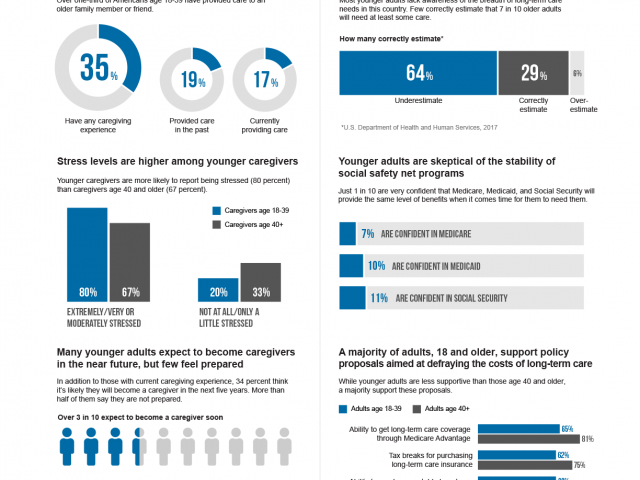
CHICAGO, May 15, 2018 — Thirty-five percent of Americans age 18 to 39 already have experience providing care to an older loved one, according to a new survey from The Associated Press-NORC Center for Public Affairs Research. The survey also reveals that just 1 in 10 young adults is very confident that Medicare, Medicaid, and Social Security will provide the same level of benefits by the time they need them.
A majority of younger adults support policy proposals aimed at defraying the costs of long-term care, though there is more support among adults age 40 and older. Eighty-one percent of younger adults think that employers should offer employees long-term care insurance plans as a benefit.
Among the poll’s findings, younger caregivers spend fewer hours providing care compared to caregivers age 40 and older, who are more than twice as likely to spend 10 or more hours a week providing unpaid care. Although they spend less time providing care, younger caregivers are more likely to report being at least moderately stressed by caregiving (80 percent) than are caregivers age 40 and older (67 percent).
“Even while younger adults report spending less time providing care than do caregivers age 40 and over, more report being stressed,” said Trevor Tompson, director of The AP-NORC Center. “This could be connected to the fact that younger caregivers report feeling much less prepared for the job than those who are older.”
To continue its study into the long‑term care experiences of American families, The AP‑NORC Center conducted its sixth annual Long‑Term Care Poll in 2018. Prior years of the poll focused on Americans age 40 and older. For the first time, this year’s study also explores the perspectives of younger adults, those age 18 to 39, generating new insights on their personal experiences with caregiving and their views of long‑term care.
Key themes and findings from this study are described below:
- Overall, prospective caregivers age 18 to 39 feel less prepared to provide care to a loved one than do those who are age 40 and older.
- Thirty-five percent of young adults already have experience providing long-term care to a loved one, either in the past (19 percent) or currently (17 percent).
- Among younger caregivers, about a quarter say they provide 10 or more hours of unpaid care per week, while about three-quarters say they provide less than 10 hours per week.
- Despite providing fewer hours of care, younger caregivers are more likely to report being at least moderately stressed (80 percent) than are caregivers age 40 and older (67 percent).
- Compared to caregivers age 40 and older, those age 18 to 39 are more likely to say they receive a good deal of support from their family (51 percent vs. 37 percent).
- When it comes to who should pay for long-term care, 53 percent of those age 18 to 39 say that private health insurance companies should have a large responsibility. Forty percent say Medicare should have a large responsibility, and 32 percent say the same about Medicaid.
- Only 15 percent of younger adults are confident that Social Security, Medicare, and Medicaid will provide the same level of benefits five years from now that they do today.
- Younger adults are even less confident when thinking further down the line. Just 1 in 10 is confident that Social Security, Medicare, and Medicaid will maintain their level of benefits when it comes time for them to need these programs.
- Eighty-one percent of young adults think that employers should offer employees long-term care insurance plans as a benefit.
Additional information, including the survey’s complete topline findings, can be found on The AP‑NORC Center’s long‑term care project website at www.longtermcarepoll.org.
About the Survey
This study, funded by The SCAN Foundation, was conducted by The Associated Press-NORC Center for Public Affairs Research. Data were collected using the AmeriSpeak® Panel, NORC’s probability-based panel designed to be representative of the U.S. household population. The panel provides sample coverage of approximately 97 percent of the U.S. household population. Of note for this study, the panel may exclude recipients of long-term care who live in some institutional types of settings, such as skilled nursing facilities or nursing homes, depending on how addresses are listed for the facility. Staff from NORC at the University of Chicago, The Associated Press, and The SCAN Foundation collaborated on all aspects of the study.
Interviews for this survey were conducted between March 13 and April 5, 2018, with adults age 18 and older representing the 50 states and the District of Columbia. Panel members were randomly drawn from AmeriSpeak, and 1,945 completed the survey, including 423 adults age 18 to 39 and 1,522 adults age 40 and older. For purposes of analysis, adults age 40 and older and Hispanic older adults were sampled at a higher rate than their proportion of the population, then weighted back to their proper proportion in the survey, according to the most recent Census. Interviews were conducted in both English and Spanish, depending on respondent preference. Respondents were offered a small monetary incentive ($3) for completing the survey. The overall margin of sampling error is +/- 3.3 percentage points at the 95 percent confidence level, including the design effect. Among adults age 18-39, the margin of sampling error is +/- 6.7 percentage points. Among adults age 40 and older, the margin of sampling error is +/- 3.3 percentage points.
About The Associated Press-NORC Center for Public Affairs Research
The AP-NORC Center for Public Affairs Research taps into the power of social science research and the highest-quality journalism to bring key information to people across the nation and throughout the world.
www.apnorc.org
The Associated Press (AP) is the essential global news network, delivering fast, unbiased news from every corner of the world to all media platforms and formats. Founded in 1846, AP today is the most trusted source of independent news and information. On any given day, more than half the world’s population sees news from AP.
www.ap.org
NORC at the University of Chicago is an objective, non-partisan research institution that delivers reliable data and rigorous analysis to guide critical programmatic, business, and policy decisions. Since 1941, NORC has conducted groundbreaking studies, created and applied innovative methods and tools, and advanced principles of scientific integrity and collaboration. Today, government, corporate, and nonprofit clients around the world partner with NORC to transform increasingly complex information into useful knowledge.
The two organizations have established The AP-NORC Center for Public Affairs Research to conduct, analyze, and distribute social science research in the public interest on newsworthy topics, and to use the power of journalism to tell the stories that research reveals.
###
Contact: For more information, contact Eric Young for NORC at young-eric@norc.org or (703) 217-6814 (cell); Ray Boyer for NORC at boyer-ray@norc.org or (312) 330-6433; or Lauren Easton for AP at leaston@ap.org.



